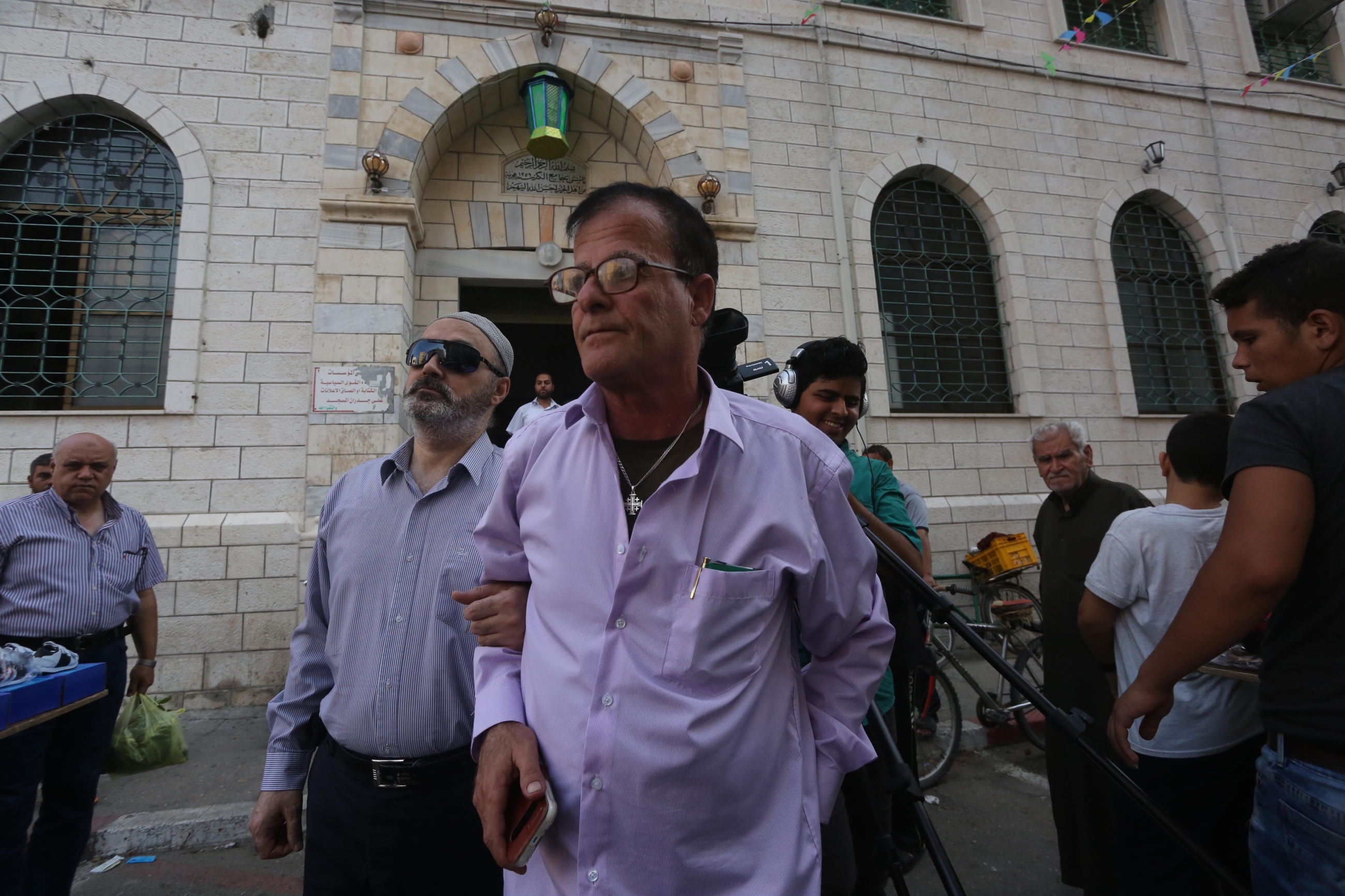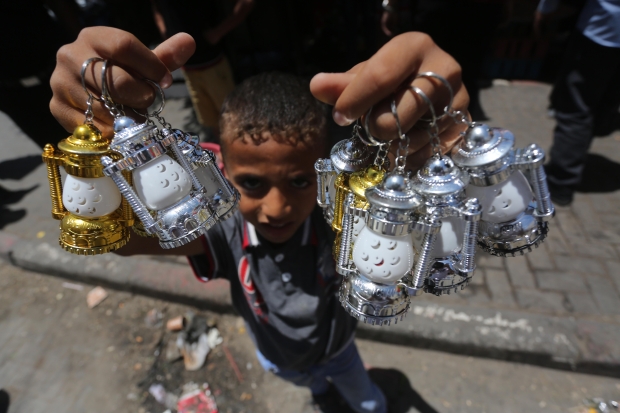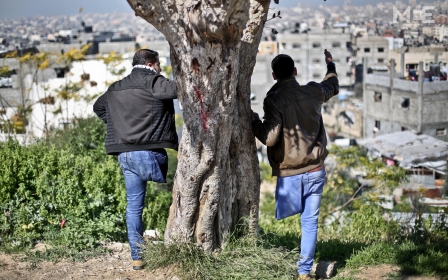Blind prayer in Gaza: How a Christian helps his friend to mosque every day

GAZA CITY, Gaza - The month of Ramadan in Gaza is seen as a time of unity where neighbours come together regardless of religion or class.
The renewed sense of community is clear for all to see, with people going out of their way to help one another. But few can speak of a bond as close as that of Kamal Tarazi, a 55-year-old Christian and his blind neighbour, 45-year-old Hatem Khries.
During the holy month, Tarazi has taken Khries to the al-Burno mosque five times a day, every day, so that the blind man can pray. Tarazi then waits for the prayers to finish so that he can take his neighbour safely home. The first prayer is at dawn and the last one after dusk, but Tarazi says he does not mind the gruelling routine.
“Now, my friend is happy,” Tarazi told Middle East Eye. “We have been friends for 15 years, and have always shared our joys and pains.
“We are never separated - everyone knows I am Christian and he is a Muslim and they are amazed at how deep our friendship is,” he added.
The bond has grown so close that even throughout the rest of the year, Tarazi goes to the mosque with Khries on Friday, and Khries goes to church with Tarazi on Sundays.
Khries, a pharmacist, lost his sight five years following an industrial accident at his pharmacy. He says that his bond with his Christian neighbour has “helped him hugely” ever since. The challenge was not the first the two the men have endured together, and over the years they have helped one another overcome a host of problems: from poverty, to prison and to war.
Tarazi explained that his friend has struggled to cope with losing his independence after the accident. Tarazi, meanwhile, has also had his share of misfortune. As a firm Christian, he spent nine years in jail for his political activism in the 1980s and 1990s before being released as part of the Oslo Accords. He now lives on a meagre pension and struggles to make ends meet.
Yet the two men have found solace in one another. While other old friends are too busy getting on with their own lives to sit and talk about things with Khries now that he is blind, he says his Christian friend has all the time in the world for him and that the pair spends almost all day together.
Tarazi takes his friend shopping so that he does not miss out on walking the same old streets of al-Zawya market where he used to walk before his accident.
It is here that Khries says the smell of the spices and the sounds of stall-holders and shoppers helps to bring the hustle and bustle of Gaza to life even if he can no longer see it happening around him.
Once the shopping is over, the pair usually sit together and Tarazi reads books and papers and they debate politics.
As the night begins to set and the calls to Iftar prayer starts to ring out, the friends break their fast together.
Then, when the sun sets and both have had their Iftar meal, Tarazi once again walks Khries to the mosque. After prayers the two men usually find a public space in the city where they continue their conversations about Gaza and the future of Palestine long into the night.
In Gaza, Tarazi says, nothing makes a Gaza Christian any different from their Muslim fellows and neighbours.
“A Christian in Gaza protects a Muslim and a Muslim protects a Christian - we are one body, all suffering under the same blockade,” Tarazi said.
The neighbourhood of al-Zaytoun where Tarazi and Khries live is steeped in history and is known for being one of the oldest parts of the Middle East where Muslims and Christians have lived side by side. Here, a church stands next to the mosque, while people of different faiths openly talk about living next to their Christian or Muslim neighbours for as long as they can remember.
It is in Gaza that Christians believe St Philip, one of Jesus’ 12 Apostles, continued to convert believers after baptising the Ethiopian eunuch shortly after the death of Christ. The strip's main Church of Saint Porphyrius traces its roots back to the 5th Century AD, while earlier this year remains of another 1,500 year-old church were unearthed in Gaza City.
The community, however, has been dwindling fast and there are now just 1,300 Christians in Gaza, down from around 3,000 before the 2008-2009 war with Israel.
Many have fled to the West Bank or Europe and some probably left out of a fear that Hamas would crackdown on their religion. When the ancient church was discovered, some Palestinian Christians accused the Gaza authorities of not respecting their heritage and choosing to continue to build on the site.
Tarazi dismisses the criticism and says he has always felt welcome in Gaza.
“We [the people of Gaza] have a relationship that is grounded on love and respect, despite any religious difference,” he said.
The Orthodox Church here organises food parcels for their poorer Muslim neighbours and during previous wars, when Israeli artillery and air-power hit Gaza’s population hard, the church opened its doors as shelter for all who needed it.
Last Easter, Israel issued an unusually high number of travel permits for the strip’s Christians, with two-thirds of the total Christian population being allowed to travel. Instead of scoring their Christian neighbours, most Gaza residents rejoiced.
With both Christians and Muslims alike being equally devastated by the hardships of the Israeli blockade, many say the two communities have been brought together by the adversity, as well as the constant food, water and medical shortages.
Easter and Christmas are both celebrated here and respected by Muslims, who in turn include Christians in the Eid al-Fitr celebration marking the end of Ramadan.
“Friendship goes beyond religion - if we suffer, we suffer together, if we flourish, then we will also be together,” Tarazi said as Khries nodded in agreement and smiled.
Tarazi’s and Khries’ ties are so strong that their families have also become friends and they are hopeful their bond will encourage both Christians and Muslims in the strip to ignore religious barriers.
“If I knew that there was one doctor in the world who could guarantee a high success rate for bringing back my friend’s sight, I would donate one of my eyes,” he said.
“I would live with one eye if I knew my friend would see again, and enjoy the sight of his five children, and look in their eyes.”
This article is available in French on Middle East Eye French edition.
Middle East Eye propose une couverture et une analyse indépendantes et incomparables du Moyen-Orient, de l’Afrique du Nord et d’autres régions du monde. Pour en savoir plus sur la reprise de ce contenu et les frais qui s’appliquent, veuillez remplir ce formulaire [en anglais]. Pour en savoir plus sur MEE, cliquez ici [en anglais].








